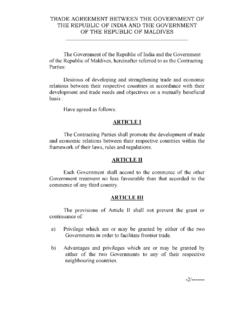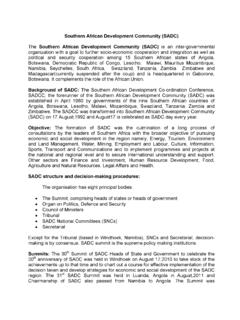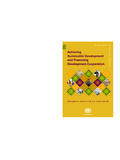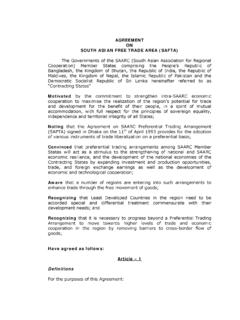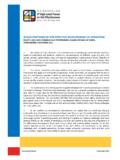Transcription of COMPREHENSIVE ECONOMIC PARTNERSHIP AGREEMENT …
1 1 COMPREHENSIVE ECONOMIC PARTNERSHIP AGREEMENT BETWEEN THE REPUBLIC OF INDIA AND JAPAN Table of Contents Preamble Chapter 1 General Provisions Article 1 Objectives Article 2 Geographical Scope of Application Article 3 General Definitions Article 4 Transparency Article 5 Administrative Procedures Article 6 Review and Appeal Article 7 Measures against Corruption Article 8 Environmental Protection Article 9 Confidential Information Article 10 Taxation Article 11 Exceptions Article 12 Relation to Other Agreements Article 13 Implementing AGREEMENT Article 14 Joint Committee Article 15 Communications Chapter 2 Trade in Goods Article 16 Definitions Article 17 Classification of Goods Article 18 National Treatment Article 19 Elimination of Customs Duties Article 20 Customs Valuation Article 21 Export Subsidies and Domestic Support Article 22 Import and Export Restrictions Article 23 Bilateral Safeguard Measures Article 24 Anti-Dumping Investigation 2 Article 25 Restrictions to Safeguard the Balance of Payments Chapter 3 Rules of Origin Article 26 Definitions Article 27 Originating Goods Article 28 Wholly Obtained or Produced Goods Article 29 Goods Produced Using Non-Originating Materials Article 30 Calculation of Qualifying Value Content Article 31 Accumulation Article 32 De Minimis Article 33 Non-Qualifying Operations Article 34 Consignment Criteria Article 35 Unassembled or Disassembled Goods Article 36 Fungible Goods and Materials Article 37 Indirect Materials Article 38 Accessories, Spare Parts.
2 Tools and Instructional or Other Information Materials Article 39 Packing and Packaging Materials and Containers Article 40 Operational Certification Procedures Article 41 Sub-Committee on Rules of Origin Chapter 4 Customs Procedures Article 42 Scope and Objectives Article 43 Definition Article 44 Transparency Article 45 Customs Clearance Article 46 Temporary Admission and Goods in Transit Article 47 Advance Rulings Article 48 cooperation and Exchange of Information Article 49 Sub-Committee on Customs Procedures Chapter 5 Technical Regulations, Standards and Conformity Assessment Procedures, and Sanitary and Phytosanitary Measures Article 50 Scope 3 Article 51 Reaffirmation of Rights and Obligations Article 52 Enquiry Points Article 53 Sub-Committee on Technical Regulations, Standards and Conformity Assessment Procedures, and SPS Measures Article 54 cooperation on Generic Medicine Article 55 Mutual Recognition Article 56 Non-Application of Chapter 14 Chapter 6 Trade in Services Article 57 Scope Article 58 Definitions Article 59 Market Access Article 60 National Treatment Article 61 Additional Commitments Article 62 Schedule of Specific Commitments Article 63 Most-Favoured-Nation Treatment Article 64 Domestic Regulation Article 65 Recognition Article 66 Transparency Article 67 Monopolies and Exclusive Service Suppliers Article 68 Payments and Transfers Article 69 Restrictions to Safeguard the Balance of Payments Article 70 Subsidies Article 71 Review of Commitments Article 72 Sub-Committee on Trade in Services Chapter 7 Movement of Natural Persons Article 73 General Principles Article 74 Scope Article 75 Definition Article 76 Specific Commitments Article
3 77 Regulatory Transparency 4 Article 78 General Principles for Grant of Entry and Temporary Stay and Related Issues Article 79 Accompanying Spouse and Dependent Article 80 Dispute Settlement Article 81 Reservations Article 82 Further Negotiations Chapter 8 Investment Article 83 Scope Article 84 Definitions Article 85 National Treatment Article 86 Most-Favoured-Nation Treatment Article 87 General Treatment Article 88 Access to the Courts of Justice Article 89 Prohibition of Performance Requirements Article 90 Reservations and Exceptions Article 91 Special Formalities and Information Requirements Article 92 Expropriation and Compensation Article 93 Protection from Strife Article 94 Transfers Article 95 Subrogation Article 96 Settlement of Investment Disputes between a Party and an Investor of the Other Party Article 97 Temporary Safeguard Measures Article 98 Prudential Measures Article 99 Environmental Measures Article 100 Relation to Other Obligations Article 101 Duration and Termination Chapter 9 Intellectual Property Article 102 General Provisions Article 103 Streamlining of Procedural Matters 5 Article 104 Promotion of Public Awareness Concerning Protection of Intellectual Property Article 105 Patents Article 106 Trademarks Article 107 Geographical Indications Article 108 Unfair Competition Article 109 Security Exceptions Chapter 10 Government Procurement Article 110 Procurement Principle Article 111 Non-Discrimination Article 112 Exchange of Information Article 113 Further Negotiations Article 114 Negotiations on Non-Discrimination Article 115 Exceptions Chapter 11 Competition Article 116 Anticompetitive Activities Article 117 Definitions Article 118 cooperation on Controlling Anticompetitive
4 Activities Article 119 Non-Discrimination Article 120 Procedural Fairness Article 121 Transparency Article 122 Non-Application of Chapter 14 Chapter 12 Improvement of Business Environment Article 123 Basic Principles Article 124 Sub-Committee on Improvement of Business Environment Article 125 Consultative Group Article 126 Liaison Office Article 127 Non-Application of Chapter 14 Chapter 13 cooperation Article 128 Basic Principle and Objectives Article 129 Fields of cooperation 6 Article 130 Scope and Forms of cooperation Article 131 Implementation and Costs Article 132 Non-Application of Chapter 14 Chapter 14 Dispute Settlement Article 133 Scope Article 134 Consultations Article 135 Good Offices, Conciliation or Mediation Article 136 Establishment of Arbitral Tribunals Article 137 Functions of Arbitral Tribunals Article 138 Proceedings of Arbitral Tribunals Article 139 Termination of Proceedings Article 140 Implementation of Award Article 141 Expenses Article 142 Language Chapter 15 Final Provisions Article 143 Table of Contents and Headings Article 144 Annexes and Notes Article 145 Amendment Article 146 Entry into Force Article 147 Termination Annex 1 Referred to in Chapter 2 Schedules in relation to Article 19 Annex 2 Referred to in Chapter 3 Product Specific Rules Annex 3 Referred to in Chapter 3 Operational Certification Procedures Annex 4 Referred to in Chapter 6 Financial Services Annex 5 Referred to in Chapter 6 Telecommunications Services Annex 6 Referred to in Chapter 6 Schedules of Specific Commitments in relation to Article 62 Annex 7 Referred to in Chapter 7
5 Specific Commitments for the Movement of Natural Persons Annex 8 Referred to in Chapter 8 Reservations for Measures referred to in paragraph 1 of Article 90 7 Annex 9 Referred to in Chapter 8 Reservations for Measures referred to in paragraph 2 of Article 90 Annex 10 Referred to in Chapter 8 Expropriation 8 Preamble The Republic of India (hereinafter referred to as India ) and Japan, RECOGNISING that a dynamic and rapidly changing global environment brought about by globalisation and technological progress presents various ECONOMIC and strategic challenges and opportunities to the Parties; CONSCIOUS of their longstanding friendship and strong ECONOMIC and political ties that have developed through many years of fruitful and mutually beneficial cooperation between the Parties; BELIEVING that such bilateral relationship will be enhanced by forging mutually beneficial ECONOMIC PARTNERSHIP through liberalisation and facilitation of trade and investment, and cooperation ; REAFFIRMING that the ECONOMIC PARTNERSHIP will provide a useful framework for enhanced cooperation and serve the common interests of the Parties in various fields as agreed in this AGREEMENT and lead to the improvement of ECONOMIC efficiency and the development of trade, investment, and human resources; RECOGNISING that the ECONOMIC PARTNERSHIP will create larger and new market, enhance the attractiveness and vibrancy of their markets, and contribute to improving efficiency and competitiveness of their manufacturing and service industries.
6 FURTHER RECOGNISING that the ECONOMIC development, social development and environmental protection are interdependent and mutually reinforcing components of sustainable development and that the ECONOMIC PARTNERSHIP can play an important role in promoting sustainable development; RECALLING Article XXIV of the General AGREEMENT on Tariffs and Trade 1994 and Article V of the General AGREEMENT on Trade in Services in Annex 1A and Annex 1B, respectively, to the Marrakesh AGREEMENT Establishing the World Trade Organization, done at Marrakesh, April 15, 1994; REAFFIRMING their rights to pursue their ECONOMIC and development goals and their rights to realise their national policy objectives; CONVINCED that this AGREEMENT would open a new era for the relationship between the Parties; RESOLVED to promote trade and investment through the establishment of clear and mutually advantageous rules as well as regulatory cooperation ; 9 SHARING the belief that the ECONOMIC PARTNERSHIP would contribute to expanding trade and investment not only between the Parties but also in the region; and DETERMINED to establish a legal framework for an ECONOMIC PARTNERSHIP between the Parties; HAVE AGREED as follows: 10 Chapter 1 General Provisions Article 1 Objectives The objectives of this AGREEMENT are to: (a) liberalise and facilitate trade in goods and services between the Parties; (b) increase investment opportunities and strengthen protection for investments and investment activities in the Parties; (c) ensure protection of intellectual property and promote cooperation in the field thereof.
7 (d) promote cooperation for the effective enforcement of competition laws in each Party; (e) improve business environment in each Party; (f) establish a framework to enhance closer cooperation in the fields agreed in this AGREEMENT ; and (g) create effective procedures for the implementation and application of this AGREEMENT and for the resolution of disputes. Article 2 Geographical Scope of Application Unless otherwise specified, this AGREEMENT shall apply to the Area of each Party, which consists of the territory of the Party, including its territorial sea, airspace above such territory; and all the area beyond its territorial sea, including the sea-bed and subsoil thereof, over which the Party has sovereign rights or jurisdiction in accordance with its laws and regulations and international law, including the United Nations Convention on the Law of the Sea, done at Montego Bay, December 10, 1982.
8 Note: Nothing in this Article shall affect the rights and obligations of the Parties under international law, including those under the United Nations Convention on the Law of the Sea, done at Montego Bay, December 10, 1982. 11 Article 3 General Definitions For the purposes of this AGREEMENT , unless otherwise specified: (a) the term customs authority means the authority that, according to the legislation of each Party or non-Parties, is responsible for the administration and enforcement of customs laws and regulations. In the case of India, the Central Board of Excise and Customs in the Department of Revenue, Ministry of Finance, and in the case of Japan, the Ministry of Finance; (b) the term days means calendar days, including weekends and holidays; (c) the term enterprise means any legal person or any other entity duly formed, constituted or organised under applicable law, whether for profit or otherwise, and whether privately-owned or controlled or governmentally-owned or controlled, including any corporation, trust, PARTNERSHIP , joint venture, sole proprietorship, association, organisation or company; (d) an enterprise is: (i) owned by an investor if more than 50 percent of the equity interests in it is beneficially owned by the investor.
9 And (ii) controlled by an investor if the investor has the power to name a majority of its directors or otherwise to legally direct its actions; (e) the term enterprise of a Party means an enterprise formed, constituted or organised under the law of a Party and carrying out substantial business activities in the Area of the Party; (f) the term GATS means the General AGREEMENT on Trade in Services in Annex 1B to the WTO AGREEMENT ; (g) the term GATT 1994 means the General AGREEMENT on Tariffs and Trade 1994 in Annex 1A to the WTO AGREEMENT . For the purposes of this AGREEMENT , references to articles in the GATT 1994 include the interpretative notes; (h) the term Harmonized System or HS means the Harmonized Commodity Description and Coding System defined in paragraph (a) of Article 1 of the International Convention on the Harmonized Commodity Description and Coding System, and adopted and implemented by the Parties in their respective laws; 12 (i) the term investments means every kind of asset owned or controlled by an investor, including: (i) an enterprise and a branch of an enterprise; (ii) shares, stocks or other forms of equity participation in an enterprise, including rights derived th




